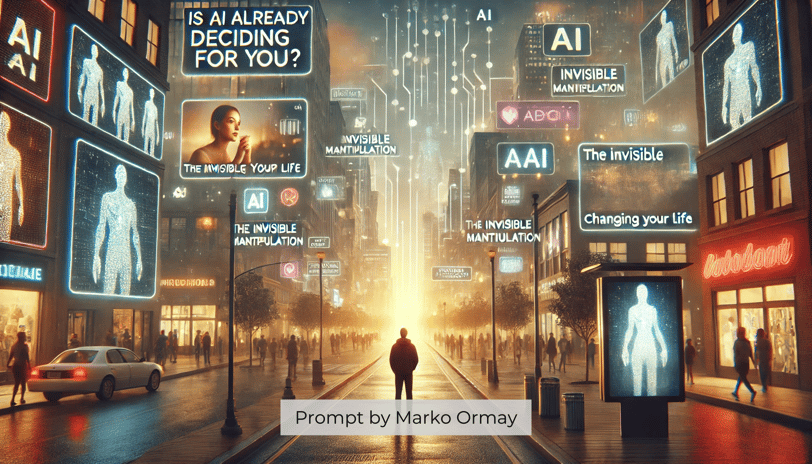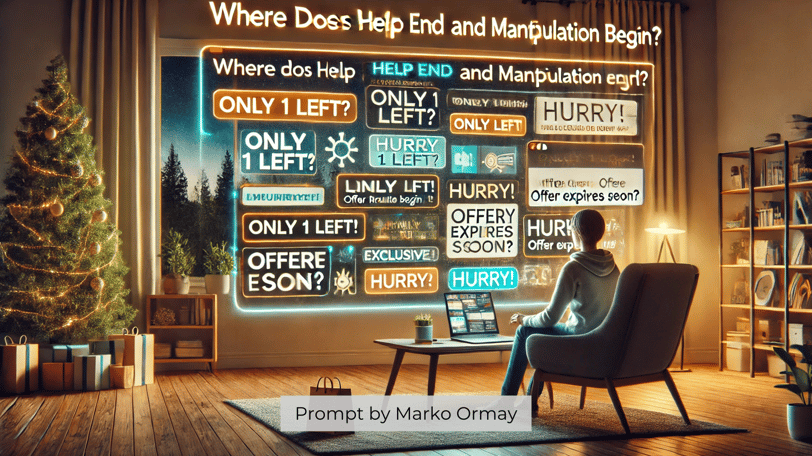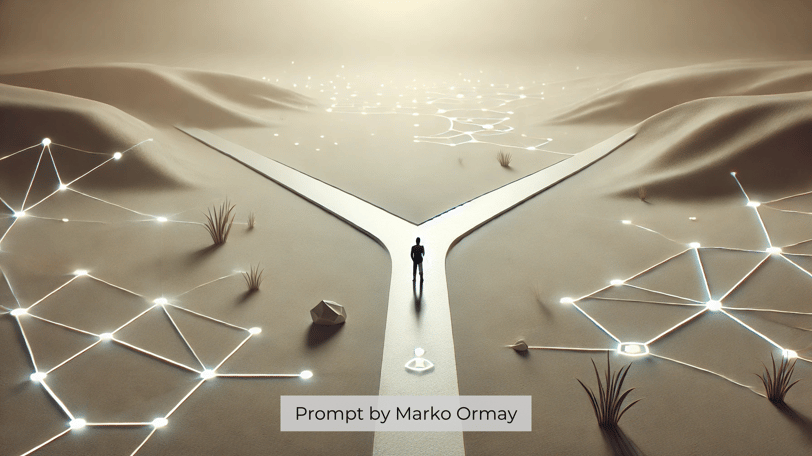Discover My Latest Book "BLACK FRIDAY MASTER" – Now Available! Order your copy here.
Is AI Already Deciding for You? The Invisible Manipulation Changing Your Life
Marko Ormay
11/20/20245 min read
The rapid development of artificial intelligence (AI) promised many benefits—simplifying everyday tasks and offering personalized experiences in nearly every aspect of our lives. However, what many of us fail to notice is how AI is already influencing our decisions, often in ways that are completely invisible. Have you ever wondered how much of your decision-making is truly your own?
How Does AI Shape Our Behavior?
Every time you open YouTube, Netflix, or Instagram, AI algorithms work behind the scenes to show you content they think you'll like or engage with. At first glance, this seems convenient—who doesn’t like personalized recommendations? But this “personalization” isn’t necessarily in your best interest.
For example, social media algorithms often favor content that stirs strong emotions—anger, fear, or excitement—because those emotions keep you engaged. The longer you stay on the platform, the more ads you see, which increases profits for the companies. This is why you often find yourself stuck in an endless scroll of content. At this point, AI has already scored its first goal—it has captured your attention, even if you’re not aware of it.
But what happens when this attention isn’t just directed toward entertainment, but toward shaping your opinions? Algorithms can prioritize certain narratives while suppressing others. This isn’t just a technological issue but also a societal one. For instance, research shows that YouTube recommendations often lead users to increasingly extreme content—whether political, social, or otherwise—because such content drives higher engagement. This not only shapes individual preferences but also influences broader societal discourse. Moreover, algorithms favor polarizing topics because they generate more intense interaction—comments, shares, and reactions. As a result, our view of the world becomes shaped by algorithms rather than critical thinking. At that point, we lose not just our attention but a portion of our freedom of choice, while AI gains the power to reshape our values and beliefs.


Where Does Help End and Manipulation Begin?
AI doesn’t just track your activities—it "learns" from them. Imagine you’re shopping for a gift for a friend online. After browsing several options, you might notice those same options “following” you on other websites and social media platforms. This is no coincidence.
These algorithms don’t just know what you’ve looked at—they analyze when, how, and for how long you considered a product. Based on this, AI can determine the perfect moment to show you an ad and prompt you to complete your purchase. Did you really decide to buy that product, or did AI "predict" the right moment to nudge you?
The real strength of AI lies in its ability to predict our behavior by analyzing patterns we often overlook. For example, algorithms might notice that you usually complete online purchases late at night after browsing a certain number of products. At that moment—when you’re relaxed or perhaps tired—AI decides to show you a limited-time offer: “Only 1 hour left to grab this discount!” This strategy leverages a psychological phenomenon known as FOMO (fear of missing out), prompting you to act impulsively. Everything is designed to make you feel like you’re making a rational decision, while you’re actually under the influence of carefully crafted algorithmic “pressure.” In moments like these, AI not only knows what motivates you but also when you’re most vulnerable to those triggers.
All of this raises a crucial question: how free are our choices in a world where algorithms constantly analyze our habits and use them to shape our decisions? In such a digital environment, the line between free will and invisible manipulation becomes increasingly blurred.


Free Will in a Digital World
One of the biggest dilemmas we face is the boundary between practical assistance and invisible manipulation. Algorithms are designed to be efficient—to optimize our experience and deliver the content we want. But in doing so, our behavioral patterns become predictable, which companies use for profit.
For example, Netflix automatically plays the next episode of a series, knowing you’re likely to stay for another hour. Or Amazon suggests “products frequently bought together” to encourage you to add more items to your cart. These strategies are no accident—they’re carefully designed to keep us “in the game.”
Similarly, apps like Spotify use algorithms to create playlists tailored to your mood, whether you’re relaxing or seeking workout motivation. While this seems helpful, it actually prevents you from exploring music outside of what the algorithm “thinks” you like, limiting your choices.
Another example comes from e-commerce: Airbnb displays alerts like “Only 1 room left for these dates!” or “8 people are currently viewing this listing.” These messages aren’t always real but are often designed to create urgency and fear of missing out. The result? You make quick decisions without fully considering your options.
Even dating apps like Tinder limit the number of daily “swipes” to encourage you to pay for premium features, which promise better chances of matching. While you think you’re investing in a better experience, AI algorithms have already analyzed your behavior patterns and devised a strategy to lead you to pay.
All these examples share a common goal—maximizing company profits. Our attention becomes currency, and our sense of free choice is often diminished under the weight of algorithmic “assistance.”


How to Recognize Manipulation
In the previous sections, we’ve seen how skilled AI is at hiding its true intentions, subtly shaping our behavior, and going to great lengths to manipulate our decisions—often invisibly but very systematically. Algorithms have become masters of psychological tricks, playing on our emotions, weaknesses, and moments of inattention, all to capture our focus or drive impulsive purchases. However, while AI may seem powerful, there are ways to regain control over our choices and free ourselves from the invisible traps of algorithms. Here’s how to recognize and reduce AI’s influence on your life:
Be aware of your habits: Monitor how much time you spend on social media or in apps. Are you there because you want to be, or because the content is designed to “hook” you?
Ask questions: When you see a personalized recommendation, ask yourself—why are they showing me this? Do I really need it?
Use time-tracking tools: Apps that limit your screen time can help you break the cycle of endless scrolling.
Distinguish real needs from artificial desires: Do you truly want that product, or has the algorithm played a key role in your choice?
AI has undeniably changed how we live, but with every new technology comes responsibility—for the companies that develop it and for us who use it. The next time you choose a movie, buy a product, or click on a recommended video, pause and ask yourself: is this my decision, or has it already been made for me?
Your answer could be the first step toward reclaiming control in the digital world.
Policies
Copyright © 2024 MarkoOrmay.com All rights reserved.
CONECT WITH ME
